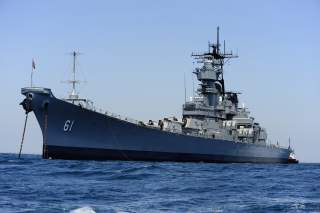You Sunk My 'Battleship': Top 5 Naval Battles of All Time
But what makes a battle decisive? And what makes one such test of arms more important than another?
1. Salamis (480 B.C.). Taken in tandem with its immediate precursors, the sea battle of Artemisium and the land battle at Thermopylae, the Battle of Salamis was part of a joint campaign that would gladden Corbett's heart. Themistocles, the founder of the Athenian navy, led an outnumbered, outmanned allied fleet against King Xerxes' Persian armada. Artemisium kept Persian sea forces from linking up with the colossal horde that had crossed the Hellespont and was lumbering overland through Greece, with the ultimate goal of conquering Europe. Themistocles' fleet then retired to the waters off Salamis Island to defend the Athenian populace, which had abandoned its city to the Persians. Guile and artful tactics let the allies overcome Persian numbers in this narrow sea. If not for Spartan and Athenian audacity, at sea as on shore, Xerxes may have throttled Western civilization in its infancy. Fending off the Great King's onslaught entitles Salamis to enduring fame. It was the most decisive naval battle in history.
Needless to say, drawing up a list like this one is tough. Many worthy candidates ended up on the cutting-room floor. China's Ming Dynasty was born through inland naval warfare, at the Battle of Lake Poyang (1363). The Battle of the Virginia Capes (1781) doomed Lord Cornwallis' army at Yorktown and assured American independence. The naval battles at Guadalcanal (1942-1943) reversed the tide of war in the Pacific, while the Battle of the Philippine Sea (1944) doomed Japanese naval aviation—paving the way for history's last major fleet engagement, at Leyte Gulf later that year. None, however, compares to the top five for world-historic significance.
Lastly, it's fun and enlightening to speculate about the dogs that didn't bark. About, that is, the naval engagements of immense consequence that could have, and perhaps should have, yet never did take place. For instance, the U.S. Navy just celebrated the bicentennial of the Battle of Lake Erie. Despite the dismal results of the War of 1812, small-scale engagements such as Lake Erie and the Battle of New Orleans impressed the British leadership with the United States' latent military and naval strength. Trivial-seeming U.S. victories implanted the idea among British statesmen that a conciliatory policy toward Washington was more prudent than trying to outmatch a republic predestined for primacy in North America and its marine environs.
Why the rise of America didn't produce a cataclysmic naval war with the supreme sea power of the day is worth mulling over. But that, as they say, is a story for another day.
James Holmes is J. C. Wylie Chair of Maritime Strategy at the Naval War College and author of “ Visualize Chinese Sea Power ,” in the current issue of the Naval Institute Proceedings. The views voiced here are his alone.


